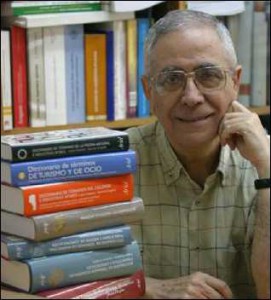
The initial germ of IULMA was the creation at the University of Alicante of a research unit called CETIVA (Centro de Terminología Industrial de la Comunidad Valenciana), by Dr. Enrique Alcaraz Varó, who led the research group “Professional and Academic English (IPA)”, within which several initiatives of special relevance have been carried out. In this sense, the series of bilingual dictionaries specialising in various professional fields that were developed at CETIVA and which have continued to be published as IULMA are particularly noteworthy. These dictionaries range from Law to Economics, Leisure, Tourism, Stock Exchange, Banking, Foreign Trade, Real Estate, Insurance, Linguistics, Pharmaceutical Sciences, Footwear, Natural Stone and Human Rights.
As a result of the important work carried out within CETIVA, there was an initiative to extend and broaden the experiences acquired to all the modern languages of the Universities of Alicante, Castellón and Valencia, integrating specialists from different branches of knowledge (Law, Economics, Pharmacy, Medicine, Computer Science, etc.) in what is now known as the Inter-University Institute of Applied Modern Languages (IULMA). After the corresponding legal procedure and having received the approval of all the bodies through which it has passed throughout the process, as well as a very positive evaluation by the National Agency for Evaluation and Prospective (ANEP), on 11 March 2005 the creation of the Inter-University Institute of Applied Modern Languages was published in the Official Gazette of the Generalitat Valenciana by Decree 55/2005 of the Consell de la Generalitat, which is currently made up of three Valencian universities: alicante, Jaume I in Castellón and Valencia-Estudi General.
The three centres work in coordination in the areas of research in which they are competent by means of a structure that is both integrative and independent in the organisation of all kinds of academic events(conferences and congresses, both national and international), agreements with public and private entities, in the provision of professional services in modern languages, both from an educational-training and judicial (forensic reports), economic and technological point of view, etc. In this sense, we can mention the various research projects awarded by the Ministry of Education and Science on subjects such as the creation of a terminology database of some industrial sectors of the Valencian Community, the industrial language of the textile and toy sector in the Valencian Community, the tile sector in Castellón or intercultural communication and the specific language of business, to name but a few. IULMA thus brings together the efforts of a large group of specialists from different languages interested in the applications of linguistics in professional and academic environments and its aim is to integrate the university with society, offering it all the knowledge of its researchers and staff.
